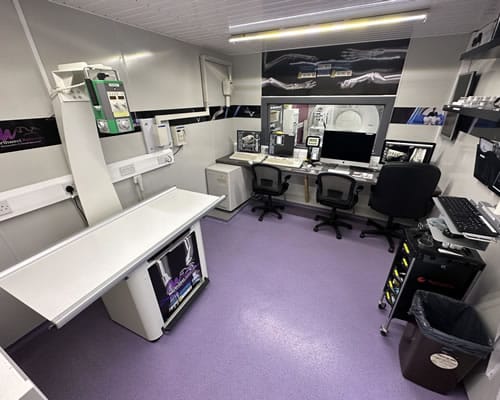Veterinary X-ray Suite
At Anrich Vets, we have a state of the art, purpose built digital x-ray suite in house. This is used for a range of different diagnosis, such as:
- Hip dysplasia
- cruciate ligament injury, some
- foreign body object identifications,
- fractures, amongst other injuries.
X-rays work by passing a small amount of radiation through the area of interest, as bone is a dense tissue; unlike skin and soft issue, it absorbs the radiation and projects an image. Our x-rays give us 2d, to scale images perfect for measuring in preparation for surgery. X-rays give instant results to allow our surgeons to diagnose.
Why We’re Different?
Our experienced vets can use our state-of-the-art resources to obtain x-ray results, which can be instantly assessed. This high level of expertise reduces the diagnosis time, meaning that your pet can receive the correct treatment quickly and efficiently. Many treatments are time-sensitive and the quicker we can start the treatment, the better for your pet.
Why an X-ray is Important And What is Involved?
An x-ray enables an experienced vet to confirm a diagnosis or pinpoint a problem. A dog may present with certain symptoms, which may indicate damage to a specific bone, but an x-ray gives the vet the confirmation that they need to suggest the best form of treatment. Fractures, for example, can come in different grades, and the treatment can vary according to the severity of the fracture. An x-ray allows the vet to adjust the treatment according to the precise nature of the injury. X-rays will be carried out using our digital x-ray suite.
Common Health Concerns
Rest assured, the level of radiation in our x-rays is very low and safe for your pet. Our x-rays are designed to provide a safe and effective way to help diagnose your pet, and the exposure to radiation is minimal. Our experienced team will be with your pet throughout the x-ray and will ensure that the procedure is stress-free for your pet.
Please get in touch with any further questions, or to make a booking.
Read our recent article: Laryngeal Paralysis in Dogs Causes, Symptoms, and Treatment

